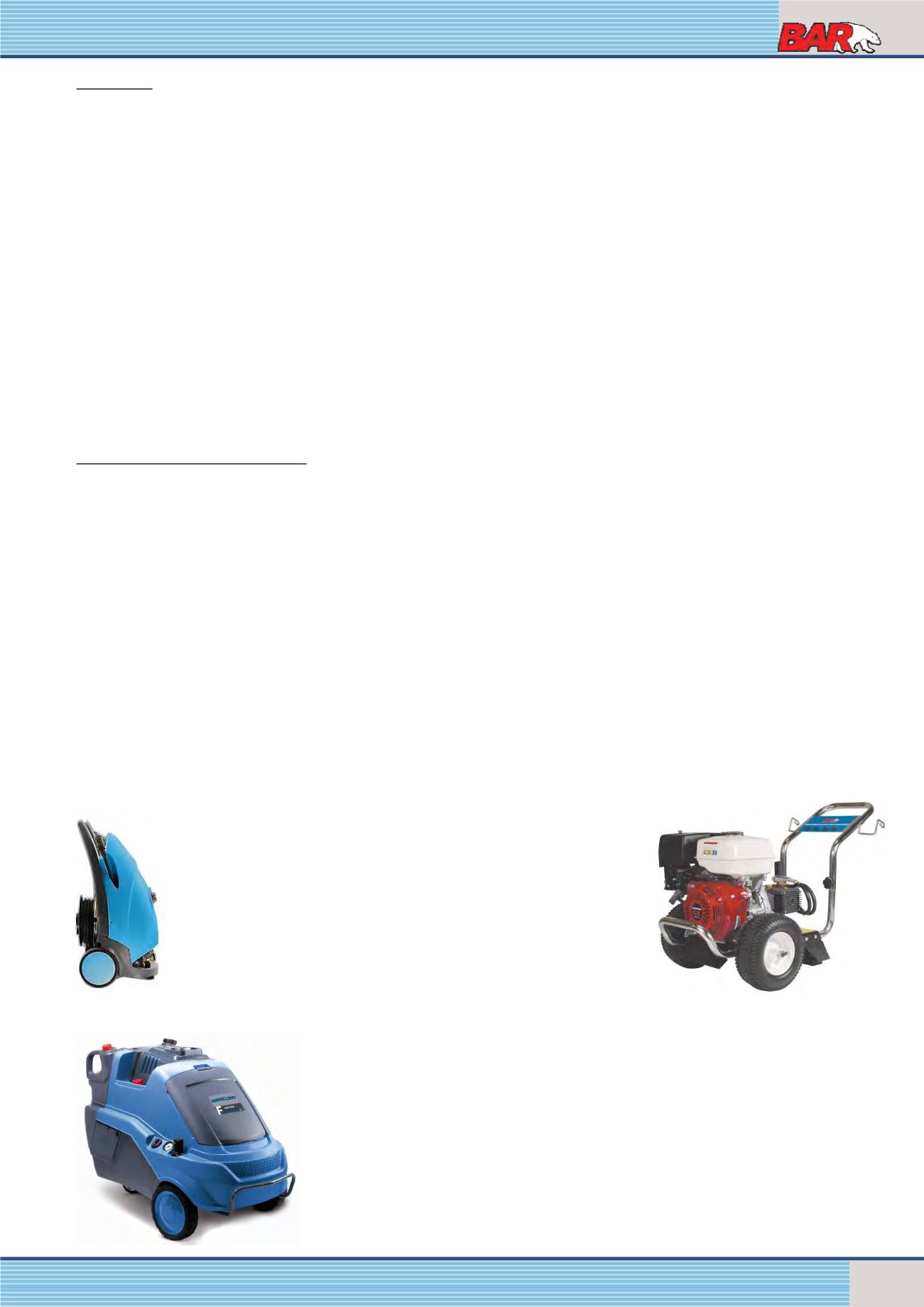
457
Pressure Cleaners
Introduction:
A world without high pressure cleaners is inconceivable. They are widely used by many trades, in agriculture, industry and car wash. Many home
and garden owners would not want to be without their high pressure cleaner either, because there is nothing as fast or thorough as a high-pressure
cleaner for cleaning your vehicle, removing moss from patios, algae from swimming pools or dirt from facades. These machines are not only use-
ful, they are
environmentally friendly
.
There are two reasons for this claim:
1)
High-pressure cleaners reduce water consumption
. The restricted bore cross section (called the nozzle), which is required to increase
pressure, reduces the water flow volume. Compared to a garden hose, for example, this achieves a water saving of up to 80%, assuming
the average suburban household pressure of about 4.5 bar, about 3,500 litres of water flow through the hose every hour, while the flow
rate through the spray lance of a high-pressure cleaner is only 400 to 600 litres in the same time.
2)
Save time and cost
. The actual time spent on the cleaning job is cut drastically and this, in turn, reduces water consumption even further.
Pressure washers can help to get rid of dirt, grime, and stains off most types of surfaces including glass, wood, steel and tar using a high pressure
flow of water. The spray of the water can be controlled with a trigger mechanism that allows the operator to spray water in either short bursts or a
continuous spray. Water is shot at such a high pressure that it acts as an abrasive to help remove dirt and stains. This is more effective than using
abrasive cleaners that can harm the surfaces you are attempting to clean.
Pressure washers come with a variety of accessories and attachment for both commercial as well as home use. These attachments include
brushes, extension wands, foam applicators, adapters and spray guns.
You can either rent or buy a pressure washer. In the long run it will probably be cheaper just to buy one, although for the heavier duty user, why
not rent first to make sure the machine does the job.
Choosing the correct Pressure Cleaner
Under pressure to choose the right pressure washer? The following guide will help you determine which pressure washer is right for you and alert
you to issues to be aware of when buying and using pressure washers.
Choice:
PSI vs. l/min. vs. CU, Electric vs. Petrol, Hot vs. Cold, Belt Drive vs. Direct, Camshaft vs. Axial Pumps. There are many options when choosing a
pressure washer that can complicate your decision. The important thing to keep in mind is to match your needs to the equipment, which will keep
your projects running smooth, and keep your overhead costs low.
PSI, l/min. and CU
When you are shopping for a pressure washer, one way to compare units is by the cleaning power of the water.
PSI - (pounds per square inch) refers to the amount of cleaning pressure the unit is capable of developing.
l/min - (litres per minute) refers to the actual flow of water through the unit or rate a which the unit sprays water.
Cleaning Units - Some manufacturers have started to use CU (cleaning units) which is simply PSI X l/min
The real challenge is to match these to your applications. Pressure washers rated at 1300-2200 PSI are for light, occasional chores such as clean-
ing a small area, lawn equipment, cars, trucks, mud or dirt. Models rated at 2200-3000 PSI are designed for more frequent users and for larger
jobs such as cleaning vinyl and wood siding easier, whether the surface is being prepared for painting or to remove dirt and grime. Units rated at
PSI 3000-4000 are for professional use on heavy-duty projects. Contractors and commercial users turn to this category to clean their heavy equip-
ment, construction sites, paint preparation and other demanding projects. Some units are rated above 4000 PSI and are designed for the special,
heavy duty cleaning jobs..
Electric vs. Petrol
Pressure washers are either electric or petrol powered.
Electric pressure washers are low maintenance and quiet, however you need easy
access to an electricity outlet. Machines which have an electric motor larger than
2.0Kw will normally need a 15amp power point rather than the standard domestic
10amp point. While smaller models are for generally for lighter duty work, they are a
much cheaper entry into pressure cleaner ownership. Industrial models normally re-
quire a three phase power point.
Petrol models are recommended for tasks that require more power, such as paint
prep, heavy vehicle cleaning, or cleaning heavily soiled concrete. Petrol models start
with PSI of 2000 and go as high as 5000. They also offer more portability, as they are
not limited by location of a power point. They are however, noisier and require regular
maintenance on the petrol engine, such as the air and oil filters.
Hot Water vs. Cold Water
Most pressure washers spray cold water which is fine for most applications. However if you need to re-
move very heavy grease then you may need to have to opt for a Hot Water Pressure Washer, utilizing a
diesel burner. The downside is that you should expect to pay a lot more for these. Also, the heater is an
additional part that requires maintenance and care. Do not run heated water through cold water systems,
since this can damage the pump O-rings and gaskets.


